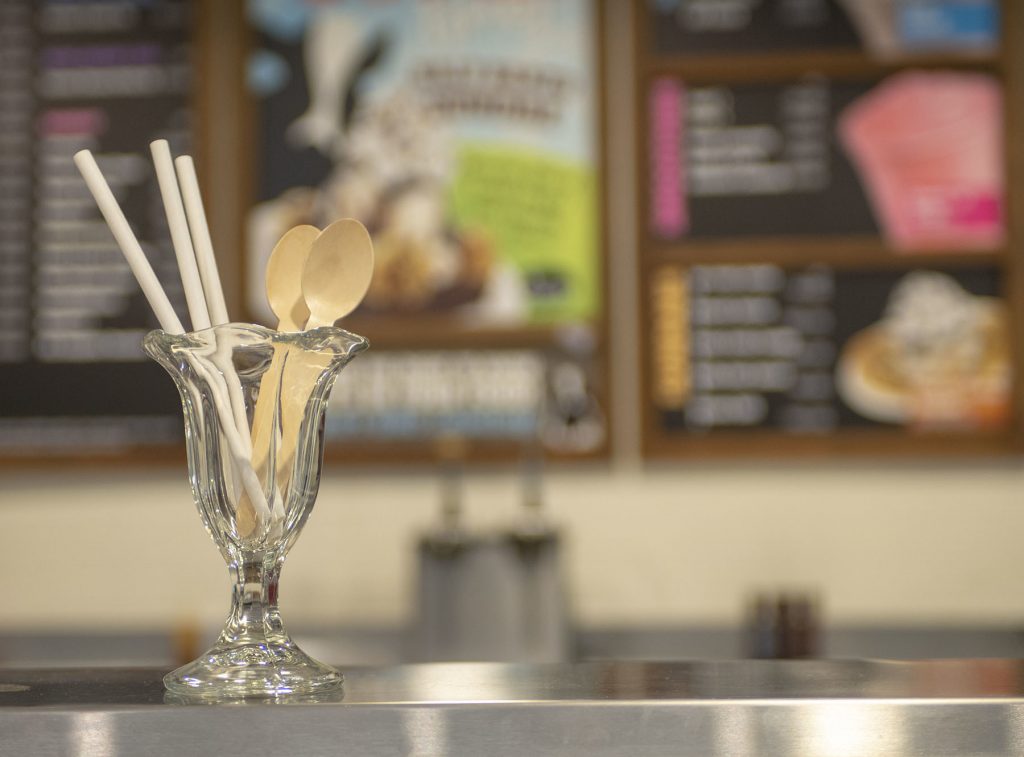Ben & Jerry’s is moving away from single-use plastic. As a first step, the company will no longer offer plastic straws and spoons in any of its more than 600 Scoop Shops worldwide in early 2019. The company also announced a plan to address plastic cups and lids used to serve ice cream by the end of 2020.
Jenna Evans, Ben & Jerry’s Global Sustainability Manager, is leading the transition. She noted that Ben & Jerry’s Scoop Shops currently hand out 2.5 million plastic straws a year, and 30 million plastic spoons. If all the plastic spoons used by Ben & Jerry’s in the US were placed end to end, they’d stretch from Burlington, Vermont to Jacksonville, Florida. “We’re not going to recycle our way out of this problem,” she said. “We, and the rest of the world, need to get out of single-use plastic.”
“Single-use plastics are a pollution threat unlike anything we’ve seen before,” said Paul Burns, executive director of the Vermont Public Interest Research Group. “Across the globe, discarded plastics are choking our environment and threatening wildlife. The only solution is to stop using them. That’s why Ben & Jerry’s plan to move away from single-use plastics is exactly the kind of leadership we need. We urge other businesses to follow Ben & Jerry’s example and kick the plastics habit.”
The company has a history of striving for more sustainable packaging solutions. Pints and “tubs” (as Ben & Jerry’s container is known in the UK and Europe) have been made with Forest Stewardship Council (FSC) Certified paperboard since 2009. But because they are coated with polyethylene to create a moisture barrier, they are difficult to recycle. Evans said Ben & Jerry’s is looking at options. “Over the past year, we have begun an intensive effort to find a biodegradable and compostable coating that meets our product quality requirements,” she said.
“In the short term, eliminating plastic straws and spoons is not going to save the world,” Evans said. “But it’s a good start toward changing expectations. We’re committed to exploring additional options to further reduce the use of disposable items. This transition is the first step for us on a more comprehensive journey to eliminate single-use, petroleum-based plastic in our supply chain, and we look forward to reporting on our progress.
“Thankfully, Ben & Jerry’s has a baked-in solution to plastic waste: it’s called our Waffle Cone,” she concluded. “They’re yummy, convenient, and waste-free!”
About Ben & Jerry’s
As an aspiring social justice company, Ben & Jerry’s believes in a greater calling than simply making a profit for selling its goods. The company produces a wide variety of super-premium ice cream, yogurt and sorbet using high-quality ingredients. Ben & Jerry’s incorporates its vision of Linked Prosperity into its business practices in a number of ways including a focus on values-led sourcing. In 2015 the company completed its transition to using entirely non-GMO (genetically modified organisms) ingredients by source as well as to fully source Fairtrade-certified ingredients wherever possible, which benefits farmers in developing countries. Ben and Jerry’s products are distributed in 35 countries in supermarkets, grocery stores, convenience stores, franchise Ben & Jerry’s Scoop Shops, restaurants and other venues. Ben & Jerry’s, a Vermont corporation and wholly-owned subsidiary of Unilever, operates its business on a three-part Mission Statement emphasizing product quality, economic reward and a commitment to the community. Ben & Jerry’s became a certified B Corp (Benefit Corporation) in 2012. The Ben & Jerry’s Foundation’s employee-led grant programs totaled $2.7MM in 2018 to support grassroots organizing for social and environmental justice around the country.


